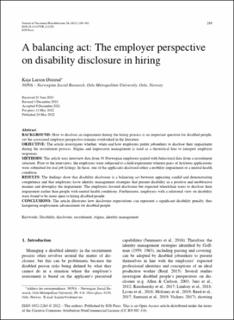A balancing act: The employer perspective on disability disclosure in hiring
Peer reviewed, Journal article
Published version
Date
2022Metadata
Show full item recordCollections
Abstract
BACKGROUND: How to disclose an impairment during the hiring process is an important question for disabled people, yet the associated employer perspective remains overlooked in the literature. OBJECTIVE: The article investigates whether, when and how employers prefer jobseekers to disclose their impairment during the recruitment process. Stigma and impression management is used as a theoretical lens to interpret employer responses. METHODS: The article uses interview data from 38 Norwegian employers paired with behavioral data from a recruitment situation. Prior to the interviews, the employers were subjected to a field experiment wherein pairs of fictitious applications were submitted for real job listings. In these, one of the applicants disclosed either a mobility impairment or a mental health condition. RESULTS: The findings show that disability disclosure is a balancing act between appearing candid and demonstrating competence and that employers favor identity management strategies that present disability in a positive and unobtrusive manner and downplay the impairment. The employers favored disclosure but expected wheelchair users to disclose their impairment earlier than people with mental health conditions. Furthermore, employers with a relational view on disability were found to be more open to hiring disabled people. CONCLUSIONS: The article illustrates how disclosure expectations can represent a significant disability penalty, thus hampering employment advancement for disabled people. A balancing act: The employer perspective on disability disclosure in hiring

